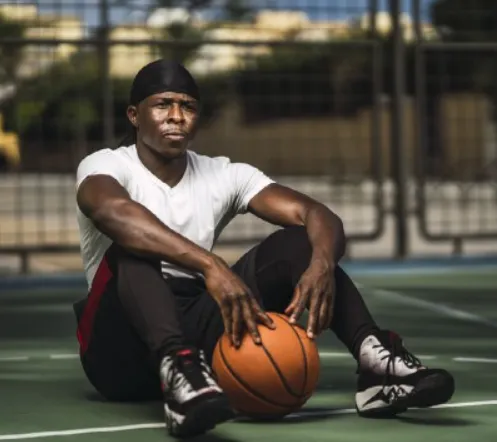Basketball is a sport that challenges not only your body but also your mind. Success on the court often depends on more than just speed, strength, or skill—it’s about mental toughness. This ability to stay composed, focused, and resilient under pressure is what separates great players from good ones. Whether you’re a young athlete learning the fundamentals or an experienced player chasing the next level, developing mental toughness is essential to thriving through both victories and setbacks.
This guide explores how to handle the obstacles every basketball player encounters, from injuries and slumps to fatigue and self-doubt. By learning how to approach these challenges with the right mindset, you’ll build the mental foundation needed to perform at your best, no matter the situation.
What Does Mental Toughness Mean in Basketball?
Mental toughness is the strength to stay positive, confident, and focused, even when things aren’t going your way. It’s about handling mistakes with composure, learning from failure, and performing under pressure. Mentally tough players bounce back quickly after setbacks and maintain their belief in themselves and their team. They stay disciplined, keep perspective, and approach every game as an opportunity for growth.
Common Setbacks Players Face—and How to Overcome Them
1. Injuries
Injuries are an unfortunate but inevitable part of sports. The key to overcoming them lies in patience and discipline. Follow your rehabilitation plan, listen to your doctors, and avoid rushing back before you’re ready. Use recovery time to focus on other areas, such as mental conditioning or studying game strategy. A strong recovery mindset can make you return stronger than before.
2. Performance Slumps
Every athlete experiences periods where shots don’t fall and confidence dips. Instead of letting frustration take over, return to the basics. Review game footage to pinpoint what needs adjustment, and focus on consistent practice. Set small, realistic goals to rebuild momentum. Remember that every slump is temporary—confidence grows when you put in the work and trust the process.
3. Limited Playing Time
Getting less time on the court can feel discouraging, but it’s also an opportunity for growth. Keep a positive attitude and focus on what you can control—your effort, energy, and preparation. Ask your coach for feedback, stay engaged during games, and support your teammates. When your chance comes, be ready to make an impact. Persistence and professionalism are always noticed.
4. Mental Fatigue
The grind of practices, games, and expectations can lead to mental exhaustion. Make rest a priority. Incorporate mindfulness exercises like meditation or breathing techniques to clear your mind. Balance basketball with other hobbies or social activities to avoid burnout. A refreshed mind leads to better focus and enjoyment of the game.
5. Team Conflicts
Disagreements are natural when passionate athletes work together. The key is communication and respect. Address issues calmly and privately when possible. Focus on shared goals and remember that teamwork is more important than personal differences. Coaches can also help mediate conflicts to ensure a positive and cohesive team environment.
6. Losing Streaks
No one enjoys losing, but consistent losses can teach valuable lessons. Analyze what went wrong and treat each game as a learning opportunity. Encourage your teammates, celebrate small improvements, and focus on effort rather than results. Staying united through tough stretches builds team character and mental resilience that pays off in the long run.
7. Balancing School and Basketball
Student-athletes face the constant challenge of managing academics and sports. Time management is crucial—use a schedule to balance classes, study time, and practice. Communicate with teachers and coaches when workloads pile up, and don’t hesitate to ask for support. Maintaining balance keeps both your performance and mental health strong.
8. Pressure to Perform
Expectations from coaches, parents, or even yourself can feel overwhelming. Learn to channel that pressure into motivation rather than stress. Create pre-game routines that calm your nerves and help you focus. Shift your attention from outcomes to effort—play for growth and enjoyment, not perfection.
9. Burnout
Training hard without proper rest can lead to physical and emotional exhaustion. Recognize the signs early—loss of motivation, irritability, or constant fatigue. Incorporate recovery days into your routine, fuel your body properly, and communicate openly with your coach if you’re feeling drained. A balanced approach keeps your passion for the game alive.
10. Handling Criticism
Every player receives criticism, but how you respond makes all the difference. View feedback as a tool for improvement rather than a personal attack. Focus on input from people who genuinely want to help you grow. Confidence comes from knowing your worth and continuously working to get better.
Frequently Asked Questions
How can I improve my mental toughness for basketball?
Practice self-awareness, goal setting, and visualization. Stay positive during tough moments and reflect on what each challenge teaches you. Working with a coach or sports psychologist can also provide techniques to strengthen your mindset.
What if I feel overwhelmed by balancing school, sports, and personal life?
Plan ahead and prioritize. Stick to a schedule that includes time for rest and relaxation. Communicate openly with teachers, coaches, and family about your workload—they’re there to help you succeed.
How can I support a teammate who’s struggling?
Be a good listener and offer encouragement. Remind them of their strengths and progress. Small gestures of support can boost team morale and help everyone stay connected.
What’s the best way to recover mentally after a bad game?
Accept it, learn from it, and move on. Focus on what you did well and set new goals for your next practice or match. Maintaining perspective helps you turn disappointment into motivation.
Final Thoughts
Mental toughness isn’t about being perfect—it’s about being persistent. Every player encounters obstacles, but those who embrace challenges as opportunities for growth come out stronger. By staying focused, managing emotions, and maintaining a positive mindset, you’ll develop the resilience needed to excel in basketball and beyond. Remember: setbacks don’t define your journey—they shape it.














